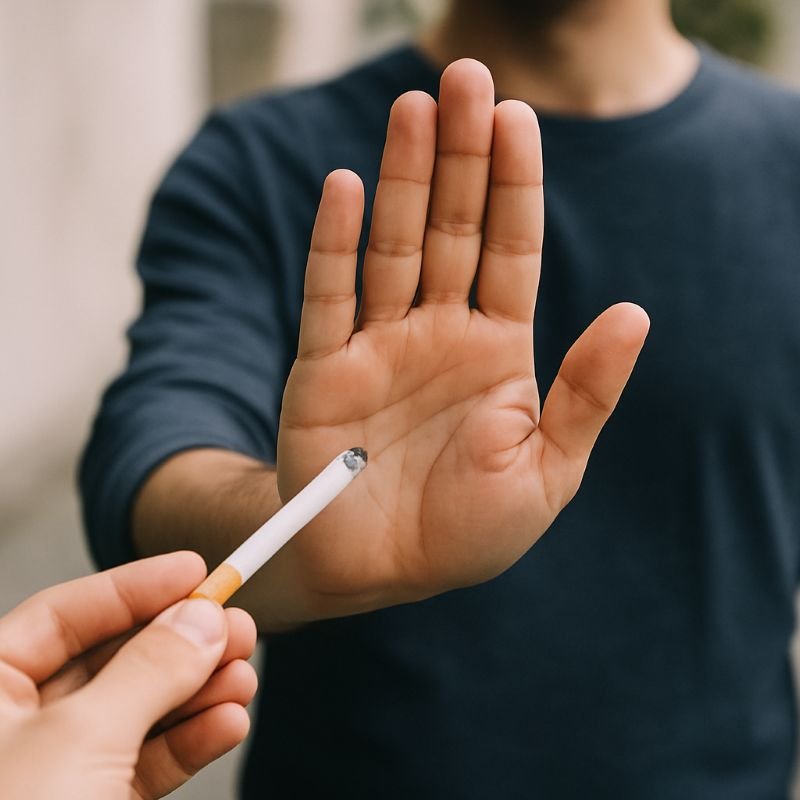Smoking or using tobacco may feel like a personal choice, but its effects go beyond just you. Tobacco kills millions every year, and even secondhand smoke damages those around you. Quitting isn’t easy, but the benefits start quickly and last a lifetime.
Why You Need To Stop Smoking
- Tobacco kills up to half of its users who don’t quit.
- It causes lung cancer, heart disease, stroke, respiratory diseases, and many other serious illnesses.
- Even using “less harmful” tobacco products (like smokeless tobacco) still carries serious risks.
WHO on quitting tobacco World Health Organization
Benefits You Get from Quitting
When you quit tobacco, your body starts repairing itself. Here’s what you can look forward to:
- Longer life & better health — Quitting can add as much as 10 years to your life compared to those who keep smoking.
- Lower risks — You reduce your chances of cancer, heart disease, kidney problems, lung disease, and more.
- Better lungs & breathing — Within months, lung function improves and coughing or wheezing lessens.
- Improved circulation & heart health — Your blood pressure and heart risk go down.
- Healthier skin, teeth & appearance — Smoking accelerates aging, stains teeth, and weakens skin. Quitting helps reverse some of that.
- Better fertility & pregnancy health — Quitting reduces risks of low birth weight, premature birth, and miscarriage.
- Boosted immune system — While quitting doesn’t immediately erase all damage, your immune system gradually recovers over time.
Read more on the benefits of quitting smoking on MedlinePlus & CDC
Tips on How to Quit
You don’t have to do it alone. Here’s how many people succeed:
- Make a quit plan – Set a date, decide your method, and know your triggers. CDC
- Counseling & support – Talk to professionals or use quit lines. Behavioral support makes a big difference. CDC
- Use quitting aids / medications – Nicotine patches, gum, inhalers, or other prescriptions can ease cravings. CDC
- Resist cravings smartly – Tips like deep breathing, delay tactics, or distraction help you outlast urges. Mayo Clinic
- Celebrate small wins – Track your smoke-free days, reward yourself for milestones.
- Ask for support from friends/family – Let people know you’re quitting so they can help encourage you.
- Don’t give up if you slip – Many people try multiple times before quitting for good. Truth Initiative
You Might Also Ask
What’s the earliest benefit after I quit?
Within minutes to hours, your heart rate and blood pressure begin to drop back toward normal levels.
Will quitting later in life still help?
Absolutely. Even quitting after many years reduces your risks of cancer, heart disease, and other illnesses. AmericanCancerSociety
Are nicotine replacement therapies safe?
Yes — NRTs (patches, gum, spray, inhalers) are safer than continuing to smoke and often help manage cravings. CDC
What if I relapse?
Slips are common. Use them as lessons—identify what caused it, adjust your strategy, and keep going.
Can quitting improve my mood?
Yes — many people report less stress, better sense of smell/taste, improved energy, and better mental health after quitting. CDC
Quitting tobacco is a gift you give your body, mind, and everyone around you. It’s not about being perfect—it’s about making a choice that benefits you in countless ways, day by day. The path won’t always be smooth, but each smoke-free hour is a win. Start small, lean on help, and keep going. You deserve to breathe easier, live healthier, and feel better.
You may also interested in Why you should get regular health checkups


[…] You may also interested in Stop smoking: Why it’s worth quitting […]